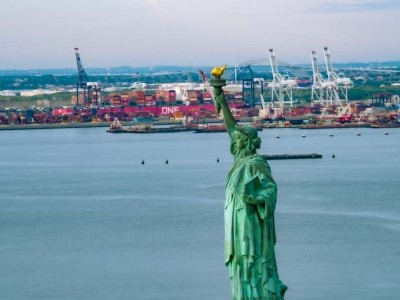Waterways Council calls President Trump’s 2021 Budget for U.S. Inland Waterways & Army Corps of Engineers “Astonishingly Inadequate”
Mar 02, 2020Waterways Council, Inc. (WCI), which represents farmers, shippers and tug and barge operators on the Mississippi and other rivers, sharply criticized President Trump’s 2021 budget proposals for the U.S. inland waterways and the U.S. Army Corps of Engineers calling them “Astonishingly Inadequate” and noting:
- The Fiscal year (FY) 2021 budget provides $0 for construction of ongoing priority navigation projects cost-shared through the Inland Waterways Trust Fund (IWTF).
- The 2021 budget proposes to cut funding for the U.S. Army Corps of Engineers’ Civil Works Mission by 22% ($5.967 billion, a $1.7 billion decrease from the FY20 enacted level).
- The President’s budget proposes $1.8 million in new user fees on commercial waterway operators so that operators will need to pay more to support the waterways.
In an interview with AJOT, Deb Calhoun, interim president, Waterways Council, Inc. noted that “Last fiscal year (FY20), Congress appropriated $335 million for four IWTF-funded projects under construction on the inland waterways system, enabling efficient funding for Kentucky Lock (Kentucky), Chickamauga Lock (Tennessee), and funding for completion of Olmsted Locks and Dam (Illinois/Kentucky) and the Lower Mon Project (Pennsylvania). If the President’s FY21 budget is accepted, these construction projects would shut down for one fiscal year, workers would be laid off, and costs would increase when the projects are restarted.”
Calhoun expects “robust support from Congress to prevent these shut downs from occurring.” However, she noted that after President Trump promised to make investment in the inland waterways a top priority, his proposed budget cuts are “a head scratcher.”
In a February 10th press release, WCI noted that “While not even spending the revenue that commercial operators pay into the IWTF to cost-share project construction, the FY21 budget also proposes to establish a new user fee to supplement existing revenue from the $0.29-per-gallon diesel fuel tax to help finance anticipated capital investment projects, as well as 10% of the cost of Operations and Maintenance (O&M), a fully Federal responsibility. The Administration anticipates this proposal would raise $1.8 billion over 10 years.”
Calhoun said that Congress needs to adequately support both the Operations and Maintenance budget for inland waterways and the Harbor Maintenance Trust Fund “which has a huge surplus” to see that funding is maintained for dredging of ship channels for ports and harbors.

She noted: “The 2019 flooding that impacted states along the Mississippi River is creating a new paradigm for flood threats as more flooding creates more silting that needs to be dredged. This threat needs to be addressed by adequate funding for the U.S. Army Corps of Engineers. Dredging keeps our waterways open for commerce and to support family farmers. Trucking and rail cannot adequately compensate for the work done by the tug and barge industry transporting agricultural exports down river and imports up river.”
“The failure to act will result in gridlock,” Calhoun warns.
Similar Stories

Strike updates on Canada’s West Coast and Port of Montreal
View ArticlePorts awarded more than half a billion in MARAD PIDP Grants
The $580 million in grants awarded today range in size from more than $53 million for the Port of San Juan Puerto Rico to restore key wharves to $708,750 for…
View Article
Port of Hamburg: Sustained growth in hinterland transports
View Article
Port of Hueneme and Port of Paita sign MoU to establish a sister port relationship
View Article
New electric yard truck helps Port of Tacoma demonstrate zero-emission technology
View Article
Port Authority of NYNJ proposes $9.4 billion budget for 2025
View ArticleGet the most up-to-date trending news!
SubscribeIndustry updates and weekly newsletter direct to your inbox!





